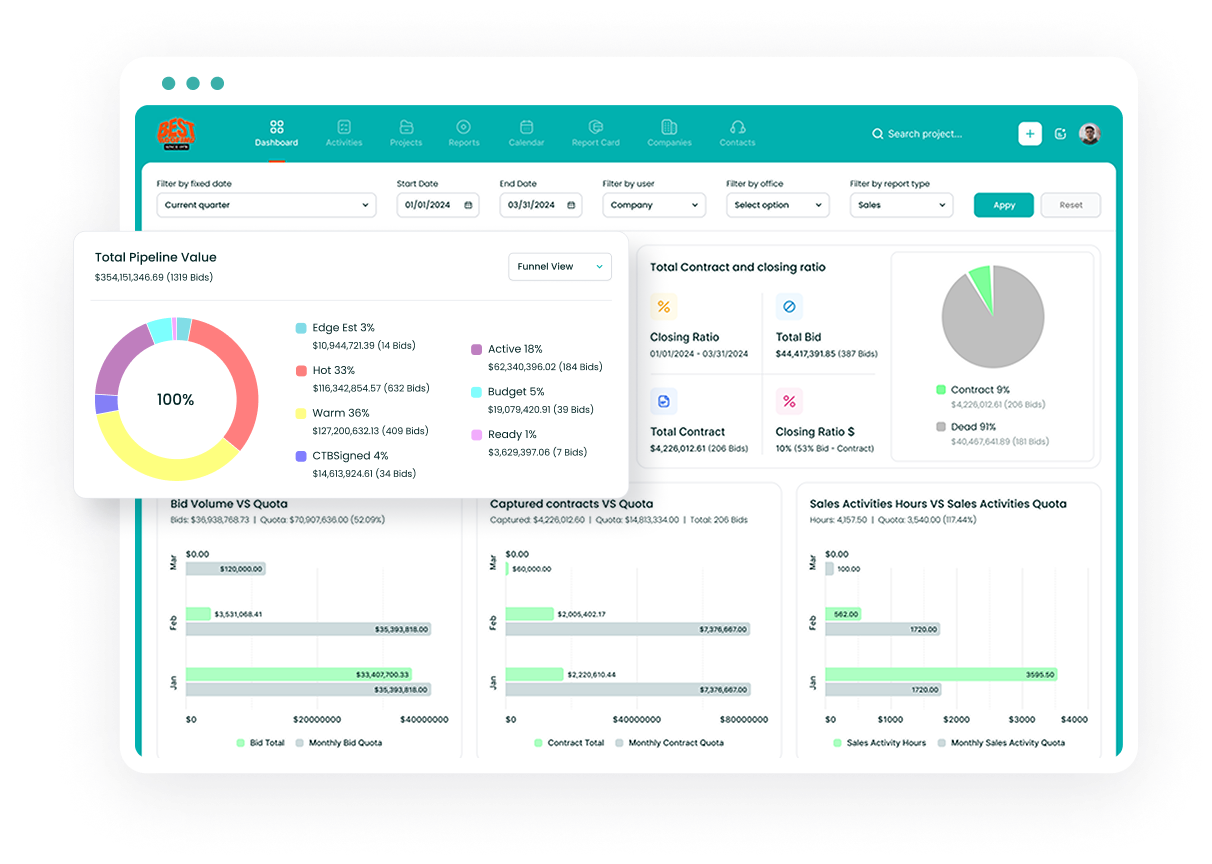How to Become a Sage 100 Contractor Consultant
Many construction companies struggle with tracking job costs, generating competitive estimates, and maintaining real-time visibility into their projects. The solution? Becoming a Sage 100 Contractor Consultant. This role not only helps mid-sized contractors streamline their business processes but also positions you as an expert in a powerful construction software solution.
What is Sage 100 Contractor
The construction industry demands precise management of business operations for companies to thrive and maintain their competitive edge. Many construction businesses face daily challenges in tracking costs, creating accurate estimates, and maintaining clear visibility of their ongoing projects. Sage 100 Contractor serves as a comprehensive solution that addresses these pain points through its specialized construction management features.
This powerful software combines construction-specific accounting capabilities with project management tools, making it an essential platform for small to mid-sized contractors. The integration of various management aspects creates a unified system where project tracking, scheduling, and financial reporting work together seamlessly. Construction companies gain immediate access to critical cost information, enabling them to make data-driven decisions that protect their profit margins.
The software's robust feature set includes detailed estimating tools, comprehensive project management capabilities, and intelligent reporting functions. These components work in harmony to provide construction businesses with the insights they need to operate efficiently and maintain profitability in an increasingly competitive market.
Essential Skills and Requirements
Before pursuing certification as a Sage 100 Contractor Consultant, professionals should develop a strong knowledge base in construction management and accounting principles. A thorough understanding of job costing methods and budget tracking serves as essential knowledge for anyone working with this specialized software. Construction industry experience provides valuable context for implementing and optimizing the software's capabilities.
Technical aptitude plays a significant role in mastering Sage 100 Contractor. Proficiency with computer systems and software applications enables consultants to navigate the platform effectively and utilize its advanced features. Experience with other construction management software provides helpful perspective when learning Sage 100 Contractor's unique approaches to common industry challenges.
The most successful consultants combine their technical abilities with strong communication skills. Working closely with construction companies requires the ability to explain complex concepts in accessible terms and guide clients through implementation processes. Building trusted relationships with clients depends on maintaining professional communication while providing practical solutions to their business challenges.
These skills contribute significantly to consultant success:
- Advanced knowledge of construction accounting principles
- Practical experience in project management
- Proficiency in financial reporting and analysis
- Strong problem-solving capabilities
- Excellent communication abilities
- Technical software expertise
Core Software Functionalities
The accounting capabilities within Sage 100 Contractor provide comprehensive tools for managing construction business finances. Consultants must thoroughly understand how to implement and optimize these features for their clients' specific needs. The system enables precise tracking of job costs against budgets, ensuring projects remain financially viable throughout their lifecycle.
Project management functionality extends beyond basic scheduling to include resource allocation, progress monitoring, and budget tracking. These integrated tools allow construction companies to maintain tight control over their projects while identifying and addressing potential issues before they impact timelines or budgets. The software's ability to handle both construction projects and service operations provides valuable flexibility for companies offering multiple service lines.
Custom reporting capabilities enable consultants to create tailored solutions for their clients' unique information needs. The system's robust data management features support detailed analysis of financial performance and project status. Real-time access to this information helps construction companies make informed decisions about resource allocation and project management.
Professional Development Path
Starting your journey toward becoming a Sage 100 Contractor Consultant begins with structured learning through official training programs. These comprehensive programs cover essential software functions and advanced features through various learning formats. Professional development continues beyond initial certification through ongoing education and community engagement.
Sage provides multiple training options to accommodate different learning styles and schedules. Video tutorials and documentation offer self-paced learning opportunities, while interactive sessions provide hands-on experience with the software. Regular training events bring consultants together to share knowledge and best practices while learning about new features and capabilities.
The certification process validates consultant expertise through rigorous testing of software knowledge and implementation skills. Maintaining certification requires ongoing education to stay current with software updates and industry developments. Active participation in the professional community provides valuable opportunities for knowledge exchange and networking.
Building practical experience remains crucial throughout the professional development process. Working with sample data and completing practice exercises helps consultants develop confidence in their abilities. Engagement with real-world scenarios prepares consultants for the challenges they will face when working with clients.
Career Growth and Opportunities
Professional certification as a Sage 100 Contractor Consultant opens doors to numerous career advancement opportunities. The construction industry's ongoing need for qualified consultants creates steady demand for certified professionals who can help companies optimize their operations. This demand often translates into competitive compensation packages and opportunities for career growth.
Certified consultants provide valuable expertise to construction companies seeking to improve their business processes. Their ability to implement effective solutions and provide ongoing support makes them essential partners in their clients' success. This trusted advisor role often leads to long-term professional relationships and expanded consulting opportunities.
The construction software consulting field continues to evolve as technology advances and industry needs change. Successful consultants stay ahead of these changes through continuous learning and professional development. Their commitment to excellence and technical proficiency earns them recognition as industry experts.
Certified consultants can explore various career paths within the construction software consulting field. Many professionals advance to leadership positions within consulting firms or take on roles as independent consultants. Others leverage their expertise to specialize in specific aspects of construction management and software implementation.
Implementation Best Practices
Successful implementation of Sage 100 Contractor requires careful planning and systematic execution to ensure optimal results. A thorough assessment of the client's current processes helps identify areas where the software can provide immediate improvements. Understanding the unique requirements of each construction business enables consultants to create tailored implementation strategies.
Data migration represents a critical phase of any implementation project. Accurate transfer of existing financial records and project information establishes a solid starting point for the new system. Proper validation procedures ensure data integrity throughout the migration process, minimizing potential disruptions to business operations.
Documentation of customized processes and configurations provides valuable reference material for clients and future maintenance. Creating detailed guides for daily operations helps users adapt to new workflows more effectively. Regular check-ins during the implementation phase allow consultants to address concerns promptly and maintain project momentum.
Client Training Strategies
Effective training programs consider various learning styles and skill levels among client staff members. Creating customized training materials that address specific business processes helps users understand how the software applies to their daily tasks. Regular assessment of user proficiency enables trainers to adjust their approach and provide additional support where needed.
Small group sessions foster an environment where users feel comfortable asking questions and sharing concerns. Hands-on exercises with real company data provide practical experience that reinforces learning objectives. Follow-up sessions address advanced features and specialized workflows once users master basic operations.
Interactive demonstrations showcase the software's capabilities while maintaining user engagement. Recording training sessions creates valuable reference materials for future use and new employee onboarding. Establishing a feedback loop helps trainers identify areas where additional instruction may benefit users.
These training components enhance user adoption:
- Customized workflow documentation
- Role-specific instruction modules
- Practical hands-on exercises
- Regular progress assessments
- Ongoing support resources
System Integration Methods
Modern construction businesses often utilize multiple software applications to manage their operations. Integration planning requires careful consideration of data flow between systems and potential impact on existing processes. Successful integration projects maintain data consistency while streamlining workflows across platforms.
Technical requirements for system integration demand thorough documentation and testing procedures. Establishing clear communication channels between different software components ensures reliable data exchange. Regular monitoring of integrated systems helps identify and resolve potential issues before they affect business operations.
Security considerations play a vital role in system integration projects. Implementing appropriate access controls and data protection measures safeguards sensitive information across connected platforms. Regular security audits verify the effectiveness of protective measures and identify areas for improvement.
These critical steps guide successful system integration:
- A comprehensive analysis of existing software systems identifies integration requirements.
- Detailed documentation outlines data mapping and transfer procedures.
- Thorough testing validates integration functionality and data accuracy.
- Regular maintenance ensures continued system performance and reliability.
- Security protocols protect sensitive information across integrated platforms.
Customization and Optimization
Adapting Sage 100 Contractor to meet specific business needs often requires customization of reports and workflows. Understanding client requirements enables consultants to develop targeted solutions that enhance productivity. Regular review of customized features ensures they continue to meet evolving business needs.
Performance optimization involves monitoring system resources and identifying potential bottlenecks. Regular maintenance procedures help maintain optimal software performance and prevent potential issues. Implementing best practices for data management supports efficient system operation and reliable reporting.
Database optimization techniques improve system responsiveness and report generation speed. Regular review of system logs helps identify areas where performance improvements may be beneficial. Proactive maintenance procedures prevent potential issues from impacting business operations.
Begin Your Certification Today
The path to becoming a Sage 100 Contractor Consultant offers significant professional growth opportunities in the construction software industry. Professional certification demonstrates expertise in construction management software and opens doors to rewarding consulting opportunities. The combination of technical knowledge and industry experience positions certified consultants as valuable partners for construction businesses.
Practical steps toward certification include completing official training programs and gaining hands-on experience with the software. Building relationships within the professional community provides valuable networking opportunities and access to industry knowledge. Maintaining current knowledge of software updates and industry trends ensures consultants remain competitive in the marketplace.
The construction industry continues to embrace digital solutions for project and financial management. Certified consultants play an essential role in helping construction companies optimize their operations and maintain competitive advantages. Taking the first step toward certification today positions professionals for success in this growing field.
The CRM Built For Construction Companies
No more disorganized data. Track your leads, bids, and customers all in one place.
Seamless Integration with:
✅ Foundation ✅ Viewpoint ✅ Sage and more

Request a Live Demo Now
Learn more about how Followup CRM can help your construction company grow.





-Jan-28-2025-05-33-14-3234-PM.webp)

-Jan-28-2025-06-23-44-0979-PM.webp)
.png)